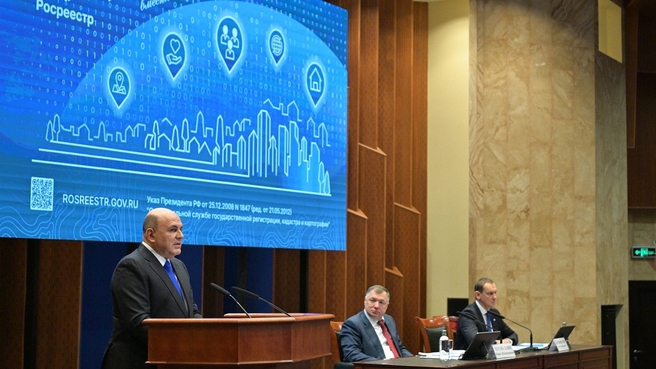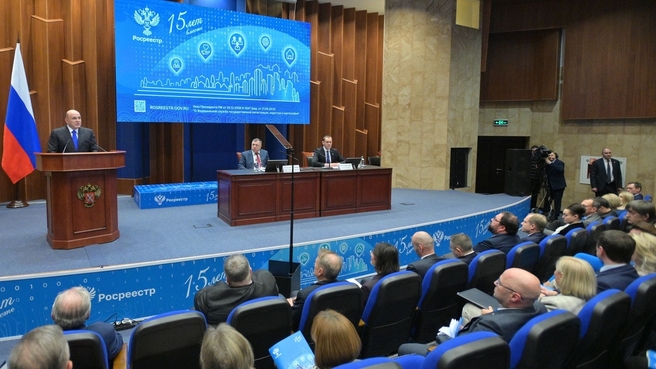During his visit to Rosreestr, the Prime Minister learned about geodesy and cartography projects and addressed a board meeting held to mark the agency’s 15th anniversary.
Mikhail Mishustin’s remarks:
Mikhail Mishustin addresses a Federal Service for State Registration, Cadastre and Cartography Board meeting
Good afternoon, friends,
I am glad to offer my greetings to all of you as we approach a memorable date, the 15th anniversary of the Federal Service for State Registration, Cadastre and Cartography.
Your agency plays an instrumental role in terms of national development. It stands on the crossroads of social and economic affairs. Its primary mission consists of guaranteeing property rights, covering residential buildings, secondary country residences, garages, and land plots. Therefore, it provides for the functioning of one of the core market institutions in our country.
It is thanks to you that all kinds of economic sectors can do their job, which includes agricultural production, the construction industry and manufacturing. Our regions are pursuing their development agendas. They have the potential to attract investors and set up manufacturing, and research and trade platforms by offering quality goods and services to our people.
Of course, we must look beyond this 15th anniversary, and you understand this very well. Your history must be counted in triple rather than double digits. After all, land inventory management has been institutionalised for centuries, no matter what the country was called, the Russian Federation, the Soviet Union, the Russian Empire, and even before that – it always needed the authorities in this sphere to gather these data. It was Catherine the Great who said that parcelling “matters and benefits not only every landowner but the state in general.”
Every era brought its own challenges and imperatives. For the past 15 years, they have mostly dealt with digitising various processes and procedures.
The way land titles used to be registered offers a telling example. You had to start with cadastral registration and then register the title. The whole procedure took about six months and sometimes an entire year, depending on the circumstances. Today, it takes just a few days to a week.
People no longer have to stand in a long queue. Over half of all applications are in the e-format. The majority of mortgage loans are also done electronically.
I would like to cite a few figures. As compared with 2000, the time needed for the registration of rights has been reduced by almost 18 times; for cadastral registration by 15 times and for the delivery of information from the Unified State Register of Real Estate (EGRN) by 10 times.
Sometimes we forget to thank those who stand at the source of this transformation. In this case, it is appropriate to express this. German Gref is here today, and he was the man who initiated these difficult changes with the President’s support.
Let me recall that the law on the state registration of rights to property, and the related transactions (I think it was the 122nd law) was passed in 1998 but it was German Gref who carried out the real reform of the cadastral property system. In 2004, he established the Federal Property Management Agency and the Federal Agency for Cadastral Property. This was a huge step forward.
Much was done to put this proper mechanism into operation. The approaches to work as a whole and the situation in this area were completely changed. Everything became more simple, transparent and convenient. He was the man who launched this important overhaul.
I remember this period with great warmth. In 2004, I headed the Real Estate Cadastre Agency. A land cadastre for modern Russia was compiled at that time. Alexei Overchuk, Svetlana Bondarchuk who is here, and Oleg Skufinsky carried out the massive assessment of property with the use of then modern technology. In this way, they laid a foundation for the development of the Federal Registration Service and spatial data.
All this made it possible to conduct large-scale assessment of all land plots and permanent buildings in a consistent format throughout the country.
Almost four years ago – in January 2020 – the service became directly subordinate to the Government and received the authority to manage land policy.
These were difficult years for the country hit by COVID and the sanctions. We met these challenges with dignity and did our best to save human lives and protect our economy. Despite the outside attempts to deter our progress, the GDP has returned to a trajectory of sustainable growth. The processing industry is rapidly expanding output. People continue buying houses and flats.
The service itself also continued developing. A strategy up to 2030 was drafted. It approved the initiative on the national system of spatial data and adopted a programme of the same name for the first time in its history. The service ensured the drafting and adoption of over 60 federal laws helping people, businesses and authorities to resolve specific problems, such as the summer house and garage amnesty, support for farmers, reduction of the investment-and-construction cycle, and the removal of administrative barriers. This is a powerful package of measures to which your service is directly related.
By the way, when I gave my report in the State Duma, the deputies asked me about my own attitude towards the garage amnesty. Frankly, I said “Of course, I support it.” I lost a garage myself and fully backed this popular decision. Almost 300,000 people have used this mechanism in a short span of time.
Over 15 million people received a title amnesty for their summerhouse. Summerhouse amnesty 2.0 was launched recently. It resolved many problems for owners, such as land registration for blocks of flats, simplified adjustment of property lines, the acquisition of ownership rights to the residences built in Soviet times, and additional protections for the rights of heirs.
Land property is a very sensitive issue for our people. I am happy that in the past few years we have done a lot to simplify registration and help people protect their rights this way.
The cadastral registration and the registration of ownership rights are now done much faster – in two days on average.
Now a few words about housing. Since 2020, the share of e-mortgage loans has increased by nine times to 85 percent of the total. The service ensures registration in 12–13 hours. This is very important to people.
Much is being done to introduce artificial intelligence technology. This was just demonstrated in the Laboratory of the Future. Four regions have completed the test operation of the digital platform, “Spatial Data National System.” As I understand it, next year, about 20 regions will join. This will provide new services for people, businesses and the authorities.
People will be able to receive land plots twice as fast and receive online information on the options for using them. This means a lot to people, and we must simply continue this work.
The creation of the Roskadastr public non-profit company is a good example of conducting administrative reform and improving the efficiency of functions in general. One full cycle enterprise will replace the four that we all know too well. The main goal is to bring the implementation of this project to completion, to fulfil it.
In addition, to reach the goals set by the President for infrastructure development until 2030, we must considerably increase the efficiency of putting federal and other land plots into circulation. We must reduce the deadlines for changing territorial planning, master plans, and the regulations for land use and development. Rapidly developing municipalities must move to master planning, something we have been talking about for a long time.
Personnel is a special issue. At present, the Greater Rosreestr system employs almost 60,000 people. All of them must be properly qualified. We have created a necessary base for upgrading them. The educational consortium unites the country’s top seven universities. This initiative was possible because of the participation of the relevant institution – the Moscow State University of Geodesy and Cartography – in the Priority-2030 Strategic Leadership Programme.
There are youth research laboratories and the profile Competence Centre of the National Technological Initiative. It is necessary to continue these efforts, to educate young specialists. Today, we had an opportunity to learn about some of their interesting projects related to your industry. I would like to make special mention of the work being carried out by Roseestr and Roskadastr in the four new regions – the Donetsk and Lugansk people’s republics, and the Zaporozhye and Kherson regions. Territorial bodies arrived there last January, and people resumed the use of the necessary services for real estate transactions. As of today, they have conducted over 300,000 accounting and registration acts.
Furthermore, the damage to the buildings has been evaluated to provide social support to their owners; the funds are now reaching the recipients faster so they can repair their property or purchase new housing.
I ask you to keep this process under close review.
Your service has already become a centre of competence in the field of land and real estate, providing a full range of services for individuals, businesses, and the authorities. As Oleg Skufinsky said today, the past four years have seen as much information entered on the Unified State Register of Real Estate as in the 20 years before that. This would not have been possible without the team effort from the Presidential Plenipotentiary Envoys, federal executive bodies and regional leaders. I would like to remind you that this work must be completed by the beginning of 2027, as per the presidential instruction.
Colleagues, friends,
You have achieved significant results, and most importantly, they contribute to resolving people’s problems.
But we cannot take a break; there is still a lot to be done. First of all, we need to further simplify access to land, facilitating its involvement in economic circulation, to shorten the investment and construction cycle, something Marat Khusnullin continues to work on. The relevant roadmap has been approved by the Government.
It is important to accelerate the regions’ connection to a single digital platform, the National Spatial Data System. This should significantly improve the country's territorial planning.
Also, in the next few years, we need to complete the migration to domestic geodetic and cartographic equipment, to ensure serial production and use. Today, I was shown examples of these technologies. I have seen a prototype of the system that you will soon be deploying.
And the most important thing is to complete the creation of a geoportal of spatial data infrastructure in the CIS member states next year in accordance with the President’s instructions. This is an interstate project, and I would like to ask you to keep it under close review.
Friends,
I want you to always remember that you are working in the interests of our people.
Here is one good example. When most of us visited China's Suzhou special economic zone, we saw a slogan there that said “The investor is our emperor.” But for you, it is imperative that your emperor is the user. The individual who uses the services of the Federal Service for State Registration, Cadastre and Cartography – the government service, if you will. You have to make every effort to earn their trust. You are the ones who can protect their property and their interests. Their trust will be the key to your service’s success.
At your exhibition today, Oleg Skufinsky and his colleagues talked a lot about feedback, about the customer journey. That feedback should indeed be the gauge by which all your agency’s services and activities are calibrated.
Once again, I wholeheartedly wish all the best to you and all the industry staff on the 15th anniversary of Rosreestr and extend my gratitude to the agency’s veterans and current employees.
I wish you all success and new achievements in your work. All the best and Happy New Year!










